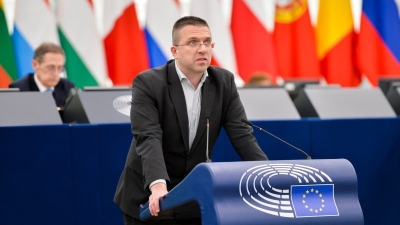Commission’s bottom trawling ban faces criticism from EU ministers

In discussions over the proposed EU bottom trawling ban, the EU executive sought to throw water on the flames of EU fisheries ministers’ criticism, which questioned the legal basis and viability of the measure.
On Monday (20 March), EU fisheries ministers gathered in Brussels to discuss the Commission’s sustainable fisheries package presented in February, which includes a contentious phase-out of bottom trawling fishing in Marine Protected Areas (MPAs) by 2030 under an action plan to protect and restore marine ecosystems.
Mobile bottom fishing – or bottom trawling – is a method of fishing that involves dragging heavily weighted nets across the sea floor in an effort to catch fish.
At the ministerial meeting, the EU executive upheld once again the need to protect the marine environment to ensure the prosperity of the fishing sector and food security.
“There are promising developments already for certain innovative tools designed to limit the impacts of these types of fishing gear,” said EU Fisheries Commissioner Virginijus Sinkevičius.
He also tried to calm the waters by reinforcing that the EU executive “is not imposing anything”, but instead seeking “a dialogue of how we can improve the current situation”.
While agreeing that fisheries, which depend on a healthy marine environment, are ‘strategic’ to food security, Spanish agriculture minister Luis Planas – who is leading the opposition to the bottom trawling phase-out along with his French counterpart – called not to ‘demonise’ these practices.
“It is a modality that has very different techniques depending on how and where it is applied,” he said before the meeting.
He warned that the result of such a ban “may be to transfer the Spanish fleet to flags that have less sustainable conditions”. “To me, that would seem to be an absolute failure,” he added.

Proposed EU bottom trawling phase-out splits stakeholders
While attempting to bring together the EU’s environmental ambitions and the economic viability of its fisheries sector, the measures proposed by the Commission have been labelled as insufficient by blue NGOs and as devastating by the industry.
EU ministers pushback
Likewise, French fisheries minister Hervé Berville stood firmly against the ban on bottom trawling, saying that he agrees on the need to protect natural resources, “but we also want to reinforce food sovereignty”.
Riding the wave of Planas’ argument, he said that a ban would result in increasingly “importing products that don’t respect the rules that we impose on ourselves”.
However, as the Commission explained in a fisheries parliamentary hearing recently, it is estimated that imports will increase only by 2%.
The degradation of ecosystems “is one of the most pressing challenges the sector is facing” as well as an actual threat to long-term food security, Sinkevičius told ministers during the discussion.
According to Sinkevicius, the Commission’s proposal does not necessarily mean the end of the activity.
“There are promising developments already for certain innovative tools designed to limit the impacts of these types of fishing gear,” he added.
Nicolas Fournier, campaign director at blue NGO Oceana, told EURACTIV that they deplore the exaggeration and scaremongering of increased seafood imports.
“The most productive fishing grounds are not located in MPAs, which represent a small part of our seas, so banning trawling in them cannot seriously affect the seafood supply,” he said.
In addition, Fournier stressed that the EU’s biggest seafood importer by far is Norway, “which has very similar seafood standards to the EU”.

Agrifood Brief: For cod’s sake!
What can go wrong in an eight-hour debate between MEPs, the Commission’s services for fisheries and for the environment right after the contentious bottom trawling phase-out in Marine Protected Areas (MPAs)?
Questioned legal basis
Other ministers showed support for the general principles of the Commission’s package, while also doubting the proposal’s legal basis to carry out the action plan and socioeconomic impact assessment.
“We are concerned about the legal framework for some of these measures,” said Portuguese minister Maria do Céu Antunes. “It’s also important for the Commission to come up with a socioeconomic impact study.”
According to ministers, it is yet not clear how the Commission will enforce the proposed ban as they present it in the form of an action plan which is non-binding – and as such, it relies on member states’ willingness to apply it.
“Wouldn’t we need a legislative measure rather than an action plan here?” asked German minister Cem Özdemir.
According to Spain’s Planas, the EU’s highest court (ECJ) jurisprudence “says that the Commission’s communications bind the Commission, but no one else” – a defiance already raised by MEPs at the last fisheries committee.
Addressing legal concerns from EU ministers, he said that the action plan “is not about creating new legal requirements” but about implementing existing legislation – such as the Common Fisheries Policy (CFP).
However, “time is a luxury that our oceans cannot afford”, he added in response to ministers’ worries over the ‘rushed’ timeline.

Agrifood Podcast: Fisheries package, CAP third pillar
This week, EURACTIV’s agrifood team walks you through the Commission’s fisheries package which includes the ambition to ban bottom trawling from all marine protected areas (MPAs) by 2030, and EURACTIV’s Paula Andrés talks to Enrico Somaglia from the European trade …



